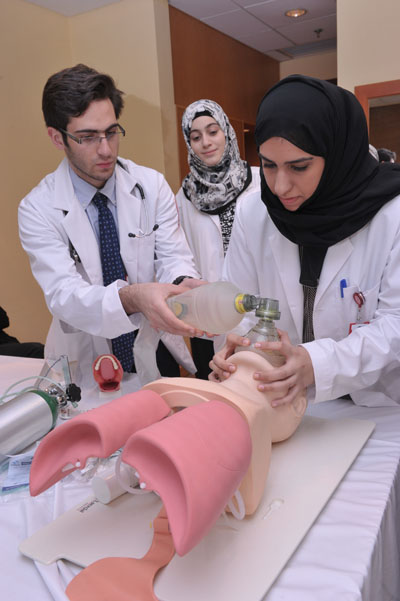First-year medical students get hands-on experience
September, 2012
From left: Erfan Alotaki, Noor Anabtawi and Ameneh Amini
conduct artificial respiration on a medical mannequin during
First Responders Training at Hamad International Training Center
First-year medical students visited Hamad International Training Center to learn how to treat injured and medically-ill patients.
As part of the annual First Responder Course for first-year medical students at Weill Cornell Medical College in Qatar (WCMC-Q) students were taught how to address chest pain and seizures, clear blocked airways, dress serious wounds and immobilize patients to prevent further injury in a series of lectures.
The students then put the theory into practice, applying slings and splints to standardized patients simulating the symptoms of broken bones and fine-tuning their airway skills on a lifelike mannequin. In a new addition to the course, course director Dr. Hina Ghory, clinical instructor in medicine at WCMC-Q and attending emergency physician at Weill Cornell Medical Center in New York, ran a role-playing workshop in disaster medicine.
Dr. Ghory said that getting hands-on experience early in their training was invaluable to the students. “We really want the students to start developing their professional identities as doctors, even though they have only just started their medical training,” she said. “The goal today is to teach our students how to provide basic medical care in the field with limited resources. It is a great foundation for the rest of their training and we find that every year the response to the course is very positive.”
Student Sally Elgazar was also pleased to get the opportunity to practice giving treatment. She said: “I found the practical sessions really useful and I hope we will do more of them in the future during the program.”
The day-long course at Hamad International Training Center on 19 September was followed the next day by an Objective Structured Clinical Skills Evaluation (OSCE). Held at the Clinical Skills Center back at WCMC-Q, the OSCE utilized moulage, role-play, and standardized patients, and required each student to manage an ill patient as a first-responder.

